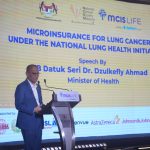Lung cancer remains the deadliest form of cancer in Malaysia, claiming more lives than any other type due to late detection and a lack of awareness. Despite medical advancements, the disease continues to have a low survival rate, raising significant concerns among healthcare experts and the Ministry of Health (MOH).
According to the Malaysian National Cancer Registry Report (MNCR), lung cancer is among the top three most common cancers in Malaysia, with over 90% of cases diagnosed at Stage III or IV.
The risk of developing lung cancer among Malaysian men has increased from 1 in 60 to 1 in 50 over the past five years. Dr. Anand Sachithanandan, Consultant Cardiothoracic Surgeon, highlighted a major misconception, stating, “Almost 60% of local survey participants wrongly believe only men get lung cancer.” In reality, 1 in 113 women will also be affected.
While smoking remains the leading cause of lung cancer due to the presence of over 7,000 harmful chemicals in tobacco, non-smokers are also at risk from second-hand smoke, indoor air pollution, and occupational hazards. The rise in e-cigarette and vape usage among Malaysians, particularly youths, has further intensified concerns. Experts warn that although vaping is marketed as a safer alternative to smoking, its long-term effects remain unclear.
Recognising the severity of the issue, the Ministry of Health has taken proactive steps by launching the Lung Health Initiative to enhance early detection and prevention efforts. This programme aims to improve access to lung cancer screenings, raise public awareness, and strengthen smoking cessation programmes.
As part of this initiative, the MOH facilitated the signing of a Memorandum of Understanding (MoU) on February 26 between eight key organisations, including the National Cancer Society Malaysia (NCSM), Malaysia Industrial Safety and Health Association (MISHA), Malaysian Drug Prevention Association (PEMADAM), Translab (M) Sdn Bhd, JNTL (Malaysia) Sdn Bhd, AstraZeneca Sdn Bhd, Johnson & Johnson Sdn Bhd, and Axios International Sdn Bhd. This collaboration aims to drive community-based lung health programs and offer support services for high-risk individuals.
With lung cancer cases on the rise, health advocates urge Malaysians to adopt an active lifestyle, embrace healthy eating habits, and reduce the consumption of processed foods, sugary products, and red meat to improve overall health. Current smokers are encouraged to quit, while non-smokers should avoid exposure to second-hand smoke.
Additionally, regular screenings are strongly recommended, as early detection significantly increases the chances of a cure. High-risk individuals, particularly current and former smokers, are advised to undergo low-dose CT scan screenings, which can detect lung cancer in its early, more treatable stages.





